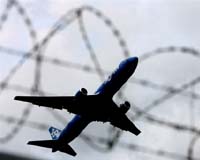| . |  |
. |
Sanaa, Yemen (UPI) Dec 14, 2009 Al-Qaida is currently circulating a gruesome videotape showing the interrogation and execution of a senior Yemeni intelligence officer, Col. Suleiman Tarbush, kidnapped in June, as a warning to Muslims who collaborate with the United States and Israel. In Iraq, an al-Qaida suicide bomber last week assassinated Lt. Col. Ahmed Subhi al-Fahal, one of the country's top counter-terrorism chiefs, in Tikrit, Saddam Hussein's hometown north of Baghdad. Al-Fahal claimed he had personally killed 250 jihadists. On Sunday, another Iraqi security chief, police Col. Saad al-Shimari, narrowly escaped death in a car bomb ambush in Fallujah, once an insurgent stronghold west of Baghdad, that killed two of his bodyguards. Al-Qaida operatives from Algeria to Pakistan are targeting the officers who lead the counter-terrorism campaigns that hunt them down. On Aug. 27 a Yemeni member of al-Qaida in the Arabian Peninsula came within an ace of assassinating the Saudi prince who was responsible for crushing the movement's 2003-07 campaign in the kingdom. Prince Mohammed bin Nayef, the deputy interior minister for security affairs, escaped with only minor wounds when explosives hidden inside the body of his would-be assassin, Abdullah Hassan Tali Assiri, exploded prematurely in the prince's palace in the Red Sea port of Jeddah. Assiri was killed instantly. He was No. 40 on a list of 85 terrorists the Saudi government deemed most dangerous. He was allowed to get so close to the prince because he had pretended to be surrendering himself. That attack sent shockwaves through the intelligence organizations of Saudi Arabia and other pro-Western Arab states that are grappling with jihadist forces. It was the first serious assassination attempt in decades against a member of the Saudi royal family, whose overthrow is one of the jihadists' main objectives, and underlined the extremists' determination to take out those who head the war against them. In November, the religious leader of al-Qaida in the Arabian Peninsula, Ibrahim al-Rubaish, called for an assassination campaign, starting with the Saudi leadership, "to instill terror and dread in the ranks of the enemy." This deadly new twist in the jihadists' global war suggests that the counter-terrorism campaign is hurting them. The growing number of jihadist plots that are being thwarted indicates that intelligence and security services, particularly in the Muslim world, are now able to penetrate terrorist cells to an unprecedented degree. To be sure, there have been other attacks on the Saudi intelligence apparatus, such as the April 21, 2004, attack on security headquarters in Riyadh, the Saudi capital, in which 10 people were killed. The attack was generally seen as a response to the effectiveness of Prince Mohammed's crackdown. In neighboring Jordan, which has been battling jihadists since the mid-1990s, security authorities claimed on April 6, 2004, that they had thwarted plans for a massive attack on the headquarters of the General Intelligence Department in Amman. The GID had earlier rolled up several al-Qaida cells that had planned attacks against U.S., Israeli and Jordanian targets. Security officials aid six trucks packed with 20 tons of chemical-laced explosives were to have been used in the attack on GID's hilltop headquarters. The jihadists are also striking back in Pakistan, the new storm center of the war against terrorism. Facilities run by the Inter-Services Intelligence directorate, Pakistan's principal intelligence service, have been attacked several times. In the worst attack on Nov. 12, a suicide bomber almost destroyed the ISI's provincial headquarters in the North-West Frontier province and killed senior officers. Those attacks were intended to demonstrate the vulnerability of the country's most powerful security agency, which is supposed to be the first line of defense against terrorism. Saudi Arabia's General Intelligence Directorate, headed by Prince Moqrin bin Abdul Aziz, has long had close links with its Pakistani equivalent. King Abdallah is reported to be personally involved behind the scenes in trying to persuade the Taliban leaders to break with al-Qaida and bring about a possible peace deal with Islamabad. To do that, the Saudis need to help Pakistan combat its Taliban problem. Many of the 85 jihadists most wanted by Riyadh are believed to be in Pakistan now, and the Saudis are working with Pakistan's counter-terrorism chief, Rehman Malik, to round them up and send them back to Saudi Arabia. That alone makes the Saudi monarchy and its intelligence services a prime target for al-Qaida. And with al-Qaida resurgent in the kingdom's trouble-plagued neighbor, Yemen, Riyadh can expect more such attacks.
Share This Article With Planet Earth
Related Links The Long War - Doctrine and Application
 Outside View: Where is the outrage?
Outside View: Where is the outrage?Washington (UPI) Dec 9, 2009 Sixty-eight years and two days ago, Japan's attack on Pearl Harbor awakened what Adm. Isoroku Yamamoto called a "sleeping giant." Nearly 60 years later, the attacks that turned civilian airliners into weapons made Sept. 11, 2001, a second day of infamy. Americans were shocked and outraged. The pressing question is where has that outrage gone? And outrage applies not only to Americans. ... read more |
|
| The content herein, unless otherwise known to be public domain, are Copyright 1995-2009 - SpaceDaily. AFP and UPI Wire Stories are copyright Agence France-Presse and United Press International. ESA Portal Reports are copyright European Space Agency. All NASA sourced material is public domain. Additional copyrights may apply in whole or part to other bona fide parties. Advertising does not imply endorsement,agreement or approval of any opinions, statements or information provided by SpaceDaily on any Web page published or hosted by SpaceDaily. Privacy Statement |